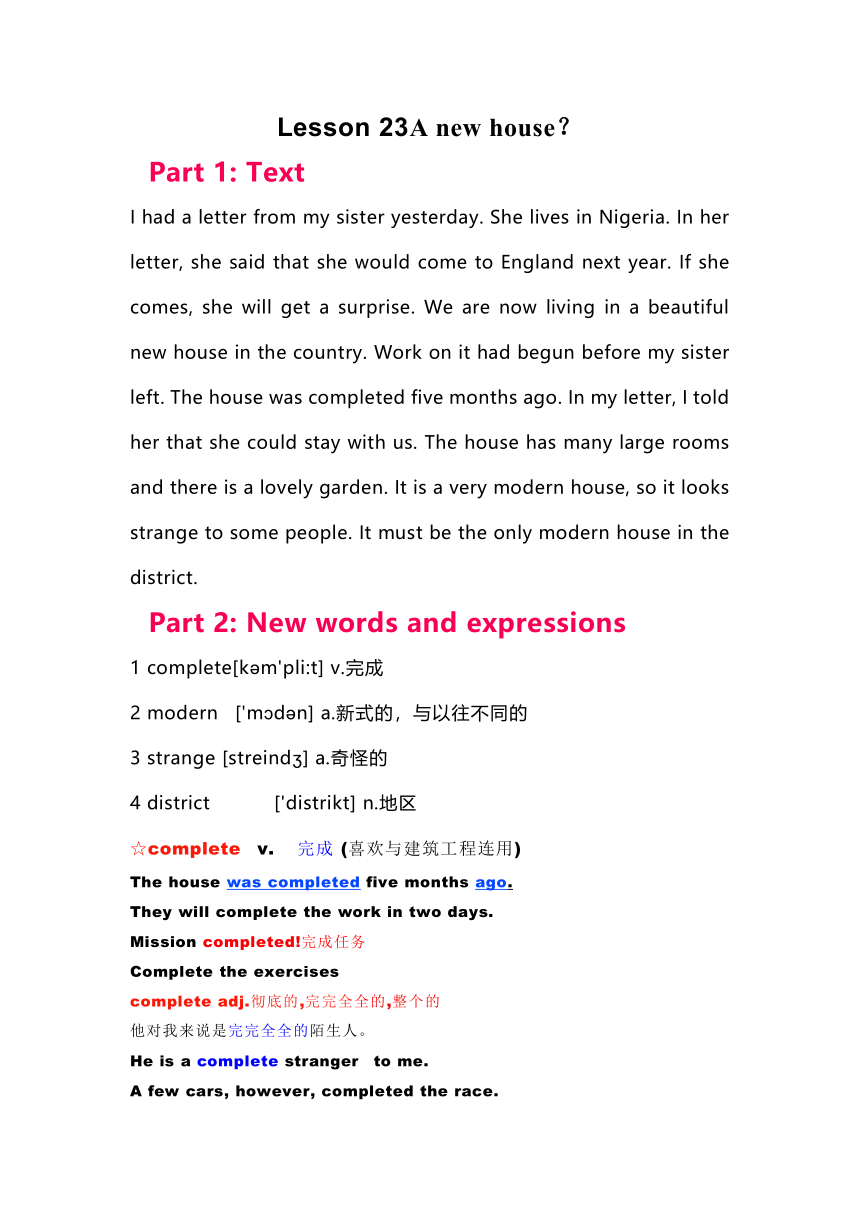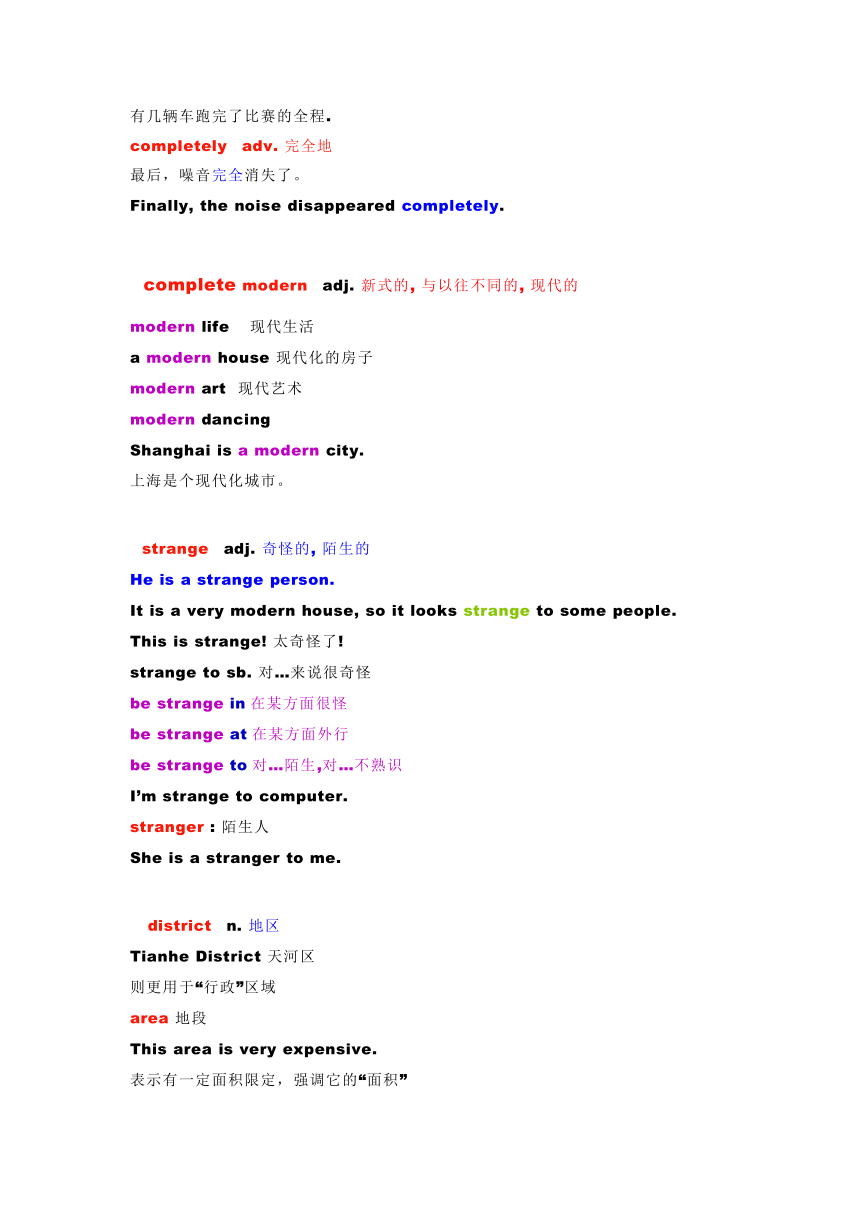新概念英语第二册 Lesson 23 A new house 讲义
文档属性
| 名称 | 新概念英语第二册 Lesson 23 A new house 讲义 |  | |
| 格式 | docx | ||
| 文件大小 | 20.5KB | ||
| 资源类型 | 教案 | ||
| 版本资源 | 新概念英语 | ||
| 科目 | 英语 | ||
| 更新时间 | 2023-09-24 22:34:47 | ||
图片预览


文档简介
Lesson 23A new house?
Part 1: Text
I had a letter from my sister yesterday. She lives in Nigeria. In her letter, she said that she would come to England next year. If she comes, she will get a surprise. We are now living in a beautiful new house in the country. Work on it had begun before my sister left. The house was completed five months ago. In my letter, I told her that she could stay with us. The house has many large rooms and there is a lovely garden. It is a very modern house, so it looks strange to some people. It must be the only modern house in the district.
Part 2: New words and expressions
1 complete[k m'pli:t] v.完成
2 modern ['m d n] a.新式的,与以往不同的
3 strange [streind ] a.奇怪的
4 district ['distrikt] n.地区
☆complete v. 完成 (喜欢与建筑工程连用)
The house was completed five months ago.
They will complete the work in two days.
Mission completed!完成任务
Complete the exercises
complete adj.彻底的,完完全全的,整个的
他对我来说是完完全全的陌生人。
He is a complete stranger to me.
A few cars, however, completed the race.
有几辆车跑完了比赛的全程.
completely adv. 完全地
最后,噪音完全消失了。
Finally, the noise disappeared completely.
complete modern adj. 新式的, 与以往不同的, 现代的
modern life 现代生活
a modern house 现代化的房子
modern art 现代艺术
modern dancing
Shanghai is a modern city.
上海是个现代化城市。
strange adj. 奇怪的, 陌生的
He is a strange person.
It is a very modern house, so it looks strange to some people.
This is strange! 太奇怪了!
strange to sb. 对…来说很奇怪
be strange in在某方面很怪
be strange at在某方面外行
be strange to对…陌生,对…不熟识
I’m strange to computer.
stranger : 陌生人
She is a stranger to me.
district n. 地区
Tianhe District 天河区
则更用于“行政”区域
area 地段
This area is very expensive.
表示有一定面积限定,强调它的“面积”
country [`k ntri] 国家 province [`pr vins] 省
city [`siti] 城市 district [`distrikt] 地区
town [taun] 镇 village [`vilid ] 村
street [stri:t] 街道 building [`bildi ] 大厦
Part 3: Notes on the text
get a surprise : 感到惊奇
Part 4: Grammar&Difficult points
句型复习
1、一般将来时:will + V. 原形
例:i'ii see you tomorrow.
2. 将来进行时:will + be + v. -ing
将来某时正在做某事或对将来某事的一种判断,推测,或是用将来进行时提问更加客气礼貌。
例:What will you be doing tomorrow 明天你干什么呀?
3. 过去完成时: had+过去分词
例: After he had finished work he went home.
他完成工作之后回家了。
4. 间接引语
He said that; He told me that
区别:said+所说内容;
told + sb+所说内容
5. if条件句
主句用将来时,从句用一般现在时。
例: If you open the door, you will get a surprise.
如果你开门的话,你会大吃一惊的。
1) 如果条件状语从句—主将从现
If you are free,I will go shopping with you.
If you come to my party,I will be very happy.
If you are hungry,we will go to the restaurant.
2) 是否 宾语从句
I wanted to know if Jim was at home.
I don’t know if there will be a bus .
Nobody knew if he could pass the exam.
6. 情态动词:must, can(could),may(might)
must, can /could, may / might + v.原形
7. 动名词
做主语,表语,动词宾语,介词宾语,定语
Fishing is my favorite sport. 钓鱼是我最喜欢的运动。
8. have的用法:
1)拥有/own;possess
2)帮助构成现在完成时have+过去分词
3)其它含义:吃,喝,做,度过...
9. 被动语态be+过去分词
例: It was bought by my grandfather many years ago.
很多年前它是被我祖父买的。
Part 5: Homework
1.背诵lesson 23单词&课文
2.Retell the story
3.复习各种语句的表达
Part 1: Text
I had a letter from my sister yesterday. She lives in Nigeria. In her letter, she said that she would come to England next year. If she comes, she will get a surprise. We are now living in a beautiful new house in the country. Work on it had begun before my sister left. The house was completed five months ago. In my letter, I told her that she could stay with us. The house has many large rooms and there is a lovely garden. It is a very modern house, so it looks strange to some people. It must be the only modern house in the district.
Part 2: New words and expressions
1 complete[k m'pli:t] v.完成
2 modern ['m d n] a.新式的,与以往不同的
3 strange [streind ] a.奇怪的
4 district ['distrikt] n.地区
☆complete v. 完成 (喜欢与建筑工程连用)
The house was completed five months ago.
They will complete the work in two days.
Mission completed!完成任务
Complete the exercises
complete adj.彻底的,完完全全的,整个的
他对我来说是完完全全的陌生人。
He is a complete stranger to me.
A few cars, however, completed the race.
有几辆车跑完了比赛的全程.
completely adv. 完全地
最后,噪音完全消失了。
Finally, the noise disappeared completely.
complete modern adj. 新式的, 与以往不同的, 现代的
modern life 现代生活
a modern house 现代化的房子
modern art 现代艺术
modern dancing
Shanghai is a modern city.
上海是个现代化城市。
strange adj. 奇怪的, 陌生的
He is a strange person.
It is a very modern house, so it looks strange to some people.
This is strange! 太奇怪了!
strange to sb. 对…来说很奇怪
be strange in在某方面很怪
be strange at在某方面外行
be strange to对…陌生,对…不熟识
I’m strange to computer.
stranger : 陌生人
She is a stranger to me.
district n. 地区
Tianhe District 天河区
则更用于“行政”区域
area 地段
This area is very expensive.
表示有一定面积限定,强调它的“面积”
country [`k ntri] 国家 province [`pr vins] 省
city [`siti] 城市 district [`distrikt] 地区
town [taun] 镇 village [`vilid ] 村
street [stri:t] 街道 building [`bildi ] 大厦
Part 3: Notes on the text
get a surprise : 感到惊奇
Part 4: Grammar&Difficult points
句型复习
1、一般将来时:will + V. 原形
例:i'ii see you tomorrow.
2. 将来进行时:will + be + v. -ing
将来某时正在做某事或对将来某事的一种判断,推测,或是用将来进行时提问更加客气礼貌。
例:What will you be doing tomorrow 明天你干什么呀?
3. 过去完成时: had+过去分词
例: After he had finished work he went home.
他完成工作之后回家了。
4. 间接引语
He said that; He told me that
区别:said+所说内容;
told + sb+所说内容
5. if条件句
主句用将来时,从句用一般现在时。
例: If you open the door, you will get a surprise.
如果你开门的话,你会大吃一惊的。
1) 如果条件状语从句—主将从现
If you are free,I will go shopping with you.
If you come to my party,I will be very happy.
If you are hungry,we will go to the restaurant.
2) 是否 宾语从句
I wanted to know if Jim was at home.
I don’t know if there will be a bus .
Nobody knew if he could pass the exam.
6. 情态动词:must, can(could),may(might)
must, can /could, may / might + v.原形
7. 动名词
做主语,表语,动词宾语,介词宾语,定语
Fishing is my favorite sport. 钓鱼是我最喜欢的运动。
8. have的用法:
1)拥有/own;possess
2)帮助构成现在完成时have+过去分词
3)其它含义:吃,喝,做,度过...
9. 被动语态be+过去分词
例: It was bought by my grandfather many years ago.
很多年前它是被我祖父买的。
Part 5: Homework
1.背诵lesson 23单词&课文
2.Retell the story
3.复习各种语句的表达
同课章节目录
